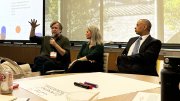During the past two years—ever since the October 7, 2023, terrorist attacks in Israel and the ensuing war in Gaza revealed deep divisions on Harvard’s campus—the question of how to foster healthy disagreement has become an urgent fixation for the University. In 2024, the College launched an Intellectual Vitality project to facilitate open discussion among undergraduates, and University administrators convened a working group to study constructive discourse, which later reported that 45 percent of students surveyed were “reluctant to share their views about charged topics in class.” The University announced a new fund for student-run bridge-building projects last fall and recently launched an “interfaith engagement” office to promote religious literacy. The 2024 Harvard admissions cycle even introduced an essay prompt about learning from disagreement. This year’s online orientation for first-year students included new programming that emphasized a similar theme. So did the speakers at the College Convocation in September.
Meanwhile, accusations of antisemitism and insufficient viewpoint diversity fueled intense scrutiny of Harvard, especially from the Trump administration, which cited these as a rationale for slashing billions in government research funding.
It is therefore unsurprising that, for the second year in a row, the question of how to teach healthy dialogue was a prominent topic of discussion at the 2025 Harvard Initiative for Learning and Teaching (HILT) conference. During a breakout session titled “Discovery and Discomfort: Facilitating Productive Disagreement,” faculty members from different parts of the University shared their strategies for improving classroom discussions. Panelists included Anthony Foxx, the director of the Center for Public Leadership at the Harvard Kennedy School; Rachel Viscomi, the director of Harvard Law School’s negotiation and mediation clinic; and Ned Hall, a professor of philosophy and the director of undergraduate studies at the Faculty of Arts and Sciences.
The panelists advised against seeking to immediately dispel discomfort when it arises in classroom discussion. Instead, they explained, discomfort should signal to teachers and facilitators that a topic deserves more attention. Sharing what tactics have worked well in their respective classrooms, Foxx emphasized the importance of setting and modeling norms for mutual respect, while Viscomi talked about the “learning zone” model developed by German pedagogy expert Tom Senniger, built around research suggesting that some discomfort is necessary for growth. Viscomi said she initiates dialogues in her classroom by assigning students a perspective to argue—ensuring that less popular views still get airtime and enabling students to explore all sides of a debate before articulating a personal perspective.
Hall contended that before teachers can facilitate debates where students take on assigned points of view, it’s imperative to teach them the purpose of employing argumentative skills. It’s not to convince the other side, he said, but to distill the reasoning “so transparently and so charitably” that everyone can “understand how this worldview hangs together.” This idea—that argument should be used to communicate curiosity rather than to persuade—seemed to resonate strongly with those in the audience.
Another topic that struck a chord was the role of feelings. Much of the audience Q&A centered on how to navigate emotions during disagreements. How do teachers validate students’ reactions without allowing emotions to control the conversation? How should facilitators think about their own cognitive load? How can you prevent a heated exchange from, as one audience member put it, “going nuclear”? Panelists advised instructors to improvise breaks when a conversation becomes too aggressive or taxing. They also emphasized the importance of teaching students to control when and how their emotions become part of their argument. Foxx elaborated on this separation: “It’s hard for people who have perhaps learned to think that their entire position on an issue is coming from a place of study and rigor,” he said, “but there’s an element of emotion that’s come into it that they’re not necessarily aware of.” He recommended office hours as a potential place to unpack challenging emotions with empathy.
To put these strategies into practice, groups of participants were assigned case studies and asked to brainstorm possible responses. These case studies ranged from students rejecting a mandatory course for their concentration due to the professor’s controversial political commentary to a classroom discussion where no dissenting ideas were ever expressed. Reconvening after the activity, each table shared what they’d discussed. “If there is consensus, don’t believe it,” said one participant. Attendees of the breakout session snapped their fingers and nodded in agreement.









